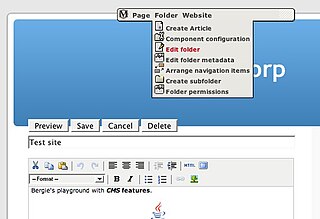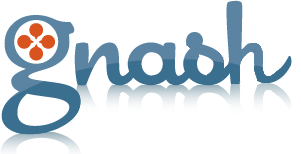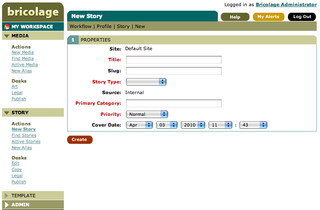
Red Hat, Inc. is an American software company that provides open source software products to enterprises and is a subsidiary of IBM. Founded in 1993, Red Hat has its corporate headquarters in Raleigh, North Carolina, with other offices worldwide.
BitKeeper is a software tool for distributed revision control of computer source code. Originally developed as proprietary software by BitMover Inc., a privately held company based in Los Gatos, California, it was released as open-source software under the Apache-2.0 license on 9 May 2016. BitKeeper is no longer being developed.

Plone is a free and open source content management system (CMS) built on top of the Zope application server. Plone is positioned as an enterprise CMS and is commonly used for intranets and as part of the web presence of large organizations. High-profile public sector users include the U.S. Federal Bureau of Investigation, Brazilian Government, United Nations, City of Bern (Switzerland), New South Wales Government (Australia), and European Environment Agency. Plone's proponents cite its security track record and its accessibility as reasons to choose Plone.

Midgard is an open source persistent storage framework. It provides an object-oriented and replicated environment for building data-intensive applications.
The Fedora Project is an independent project to co-ordinate the development of Fedora Linux, a Linux-based operating system, operating with the vision of "a world where everyone benefits from free and open source software built by inclusive, welcoming, and open-minded communities." The project's mission statement is to create "an innovative platform for hardware, clouds, and containers that enables software developers and community members to build tailored solutions for their users". The project also oversees Extra Packages for Enterprise Linux, a special interest group which maintains the eponymous packages. The project was founded in 2003 as a result of a merger between the Red Hat Linux (RHL) and Fedora Linux projects. It is sponsored by Red Hat primarily, but its employees make up only 35% of project contributors, and most of the over 2,000 contributors are unaffiliated members of the community.
Wind River Systems, also known as Wind River, is an Alameda, California–based company, subsidiary of Aptiv PLC. The company develops embedded system and cloud software consisting of real-time operating systems software, industry-specific software, simulation technology, development tools and middleware.
Free Java implementations are software projects that implement Oracle's Java technologies and are distributed under free software licences, making them free software. Sun released most of its Java source code as free software in May 2007, so it can now almost be considered a free Java implementation. Java implementations include compilers, runtimes, class libraries, etc. Advocates of free and open source software refer to free or open source Java virtual machine software as free runtimes or free Java runtimes.

DNN Platform is a web content management system and web application framework based on the .NET Framework. It is open source and part of the .Net Foundation.

Joomla, also spelled Joomla! and sometimes abbreviated as J!, is a free and open-source content management system (CMS) for publishing web content on websites. Web content applications include discussion forums, photo galleries, e-Commerce and user communities and numerous other web-based applications. Joomla is developed by a community of volunteers supported with the legal, organisational and financial resources of Open Source Matters, Inc.

Gnash is a media player for playing SWF files. Gnash is available both as a standalone player for desktop computers and embedded devices, as well as a plugin for the browsers still supporting NPAPI. It is part of the GNU Project and is a free and open-source alternative to Adobe Flash Player. It was developed from the gameswf project.
In the context of free and open-source software, proprietary software only available as a binary executable is referred to as a blob or binary blob. The term usually refers to a device driver module loaded into the kernel of an open-source operating system, and is sometimes also applied to code running outside the kernel, such as system firmware images, microcode updates, or userland programs. The term blob was first used in database management systems to describe a collection of binary data stored as a single entity.

The Linux Foundation (LF) is a non-profit technology consortium that hosts and promotes the collaborative development of open-source software projects. In addition to providing a neutral home where Linux kernel development can be protected and accelerated, the LF is dedicated to building sustainable ecosystems around open-source projects to accelerate technology development and commercial adoption.

Bricolage was a content management system (CMS) written in the Perl programming language.

CiviCRM is a web-based suite of internationalized open-source software for constituency relationship management that falls under the broad rubric of customer relationship management. It is specifically designed for the needs of non-profit, non-governmental, and advocacy groups, and serves as an association-management system.

TYPO3 is a Web content management system (CMS) written in the programming language PHP. It can run on a variety of web servers, such as Apache, Nginx, or Internet Information Services (IIS), and on many operating systems, including Linux, Microsoft Windows, FreeBSD, macOS, and OS/2. It is free and open-source software released under the GNU General Public License version 2.

BigBlueButton is a virtual classroom software program designed for online education. Accessed most commonly through a variety of Learning Management Systems, the application provides engagement tools and analytics for educators to interact with their students remotely. It is open source, except for some versions of its database software.

VirtueMart is an open-source e-commerce application designed as an extension of the Mambo or Joomla! content management systems (CMS). VirtueMart is written in PHP and requires the MySQL database environment for storage. It is best suited for low to medium level traffic web-sites.
Long-term support (LTS) is a product lifecycle management policy in which a stable release of computer software is maintained for a longer period of time than the standard edition. The term is typically reserved for open-source software, where it describes a software edition that is supported for months or years longer than the software's standard edition.










